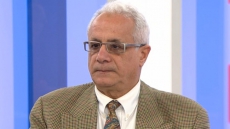It's a condition that has driven people to self-amputate limbs and, in extreme cases, commit suicide.
For those who have body integrity identity disorder (BIID), the theory is that the brain's mental map doesn't align with the physical body, said Clive Baldwin, a professor at St. Thomas University in Fredericton, N.B.
Someone with BIID, for example, may feel their right leg should end above their knee, when physically they have a fully functioning leg.
Baldwin, the Canada Research Chair in narrative studies and a professor of social work at the university, has been interviewing people with BIID in the hopes of learning more about their lives and drawing more attention to the little-known condition.
"People with BIID experience their body in a very different way to most," said Baldwin, who has interviewed about 45 people so far from across the world. "This can cause a great deal of distress. Participants talked about it as always being in the background, always taking up energy. For some it's constantly on their mind."
BIID falls under the umbrella of transableism, which refers to the desire to acquire a disability through choice rather than happenstance. Baldwin said some research has been done on the psychology of BIID, but there is very little research on what it's like to live with the suspected neurological condition.
"They tend to live quite isolated lives. They don't tell people about it," said Baldwin, adding that one man he spoke to said he has never told his wife of 50 years that he has BIID. "Life can be very difficult."
Baldwin said people with BIID are often very secretive about their condition out of fear of negative and even hostile reactions. He noted one participant told his mother he had BIID, and she ended up telling the whole community, prompting him to move thousands of miles away.
He said he's read comments from the general public like, "These people should be put down by the local vet."
"When you're anticipating that that's going to be the reaction, it's not surprising that you don't want to tell people. They're often very secretive," said Baldwin, adding that he's interviewed a doctor, university lecturer and computer scientist with BIID.
"But if the people affected by this aren't talking about it for fear of what the rest of us will do, then of course people aren't going to know about it, and services won't be developed."
Baldwin said there's no treatment or cure. BIID isn't even a medically recognized disorder, but many doctors, psychiatrists and academics use it.
Consequently, people with BIID have developed their own coping mechanisms.
Some simply bear it. Others act as they have the impairment, like using a wheelchair. One man sawed his arm off. There have been reports of people placing a limb in dry ice to damage it so badly doctors have to remove it. Many go abroad to seek surgeries. At least one person Baldwin interviewed received an amputation through government health services. Some have committed suicide.
"This isn't stuff that they're doing lightly. They've lived with decades of misery and because there's nothing out there to support them; some people become so desperate that this is the kind of stuff they're willing to try," he said.
"But everyone whom I have spoken to and every report in the published literature about those people who have acquired the disability they want ... they don't regret it. Their only regret is that they didn't do it sooner. They feel happier, more content, more one with the world and more confident. It's a positive experience for them."
Baldwin said he hopes to build more awareness about BIID. He plans to write articles about his findings and also plans to present them at conferences.
"The hope for the research is that by understanding how people live with this, it will generate a degree of compassion and a degree of awareness," said Baldwin.
He added that everyone he's spoken to with BIID has a very moral stance about it. They know that services and resources for people with disabilities are restricted and they don't want to take away from that.
"These people don't want to be dependent. They don't want to be in care. They're not trying to gain any financial benefit or gain attention. They want to live independent lives, they just want this body to match how they feel it should be," he said.




